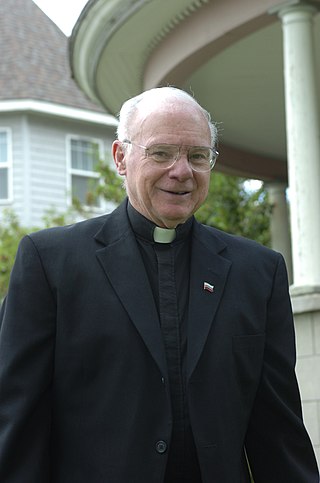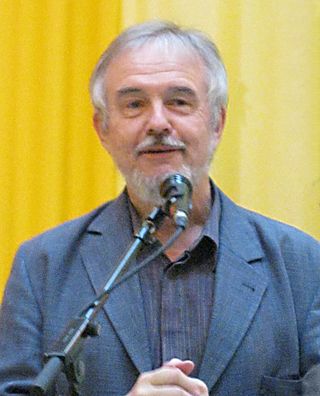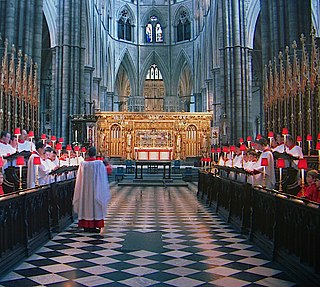
Anglican church music is music that is written for Christian worship in Anglican religious services, forming part of the liturgy. It mostly consists of pieces written to be sung by a church choir, which may sing a cappella or accompanied by an organ.
Ivan Moody was a British composer and musicologist.

Sir David Valentine Willcocks, was a British choral conductor, organist, composer and music administrator. He was particularly well known for his association with the Choir of King's College, Cambridge, which he directed from 1957 to 1974, making frequent broadcasts and recordings. Several of the descants and carol arrangements he wrote for the annual service of Nine Lessons and Carols were published in the series of books Carols for Choirs which he edited along with Reginald Jacques and John Rutter. He was also director of the Royal College of Music in London.

Psalm 51, one of the penitential psalms, is the 51st psalm of the Book of Psalms, beginning in English in the King James Version: "Have mercy upon me, O God". In the slightly different numbering system used in the Greek Septuagint and Latin Vulgate translations of the Bible, this psalm is Psalm 50. In Latin, it is known as Miserere, in Ancient Greek: Ἥ Ἐλεήμων, romanized: Hḗ Eleḗmōn), especially in musical settings. The introduction in the text says that it was composed by David as a confession to God after he sinned with Bathsheba.

Chichester Psalms is an extended choral composition in three movements by Leonard Bernstein for boy treble or countertenor, choir and orchestra. The text was arranged by the composer from the Book of Psalms in the original Hebrew. Part 1 uses Psalms 100 and 108, Part 2 uses 2 and 23, and Part 3 uses 131 and 133. Bernstein scored the work for a reduced orchestra, but also made a version for an even smaller ensemble of organ, one harp, and percussion.
Raymond Wilding-White ; was an American composer of contemporary classical music and electronic music, and a photographer/digital artist.

Colin James Brumby was an Australian composer and conductor.

Psalm 126 is the 126th psalm of the Book of Psalms, beginning in English in the King James Version: "When the Lord turned again the captivity of Zion, we were like them that dream". In Latin, it is known as In convertendo Dominus. It is one of the fifteen Songs of Ascent in the Book of Psalms whose opening words in Hebrew are "Shir HaMaalot". In the slightly different numbering system used in the Greek Septuagint version of the Bible and in the Latin Vulgate, this psalm is Psalm 125.
Jonathan Alfred Clawson Redford is an American composer, arranger, orchestrator, and conductor. He is also the author of Welcome All Wonders: A Composer's Journey.
Andrew Perkins is a New Zealand composer, choral conductor and teacher. He has had a number of works recorded and performed internationally.

J. Kevin Waters S.J. is a Jesuit priest, composer, educator, and retired Academic Dean (Emeritus) of the College of Arts and Sciences of Gonzaga University in Spokane, Washington.
Iris Szeghy is a Slovak composer living in Switzerland.
A Christmas cantata or Nativity cantata is a cantata, music for voice or voices in several movements, for Christmas. The importance of the feast inspired many composers to write cantatas for the occasion, some designed to be performed in church services, others for concert or secular celebration. The Christmas story, telling of music of the angels and suggesting music of the shepherds and cradle song, invited musical treatment. The term is called Weihnachtskantate in German, and Cantate de Noël in French. Christmas cantatas have been written on texts in several other languages, such as Czech, Italian, Romanian, and Spanish.

Peter Planyavsky is an Austrian organist and composer. He attended the Schottengymnasium. After graduating from the Vienna Academy of Music in 1966 he spent a year in an organ workshop, and has been instrumental in organ-building projects, notably the construction of the Rieger organ in the Great Hall of the Wiener Musikverein. In 1968 he was appointed organist in the Upper Austrian Stift Schlägl, and the following year organist at Vienna's St. Stephen's Cathedral. From 1983 until 1990 Planyavsky was their director of music, with overall responsibility for church music at the cathedral.

Evensong is a church service traditionally held near sunset focused on singing psalms and other biblical canticles. It is loosely based on the canonical hours of vespers and compline. Old English speakers translated the Latin word vesperas as æfensang, which became 'evensong' in modern English. Typically used in reference to the Anglican daily office's evening liturgy, it can also refer to the pre-Reformation form of vespers or services of evening prayer from other denominations, particularly within the Anglican Use of the Catholic Church.

Julian James Wachner is an American composer, conductor, and keyboardist. From 2011 to 2022, he served as the Director of Music and the Arts at Trinity Wall Street, conducting the Choir of Trinity Wall Street, the Trinity Baroque Orchestra, and NOVUS NY. Wachner recorded five albums with these ensembles, primarily for the Musica Omnia label. From 2008 to 2017, he served as the Director of The Washington Chorus. In March 2018, Wachner was named Artistic Director of the Grand Rapids Bach Festival, an affiliate of the Grand Rapids Symphony, in Grand Rapids, Michigan.

O clap your hands is a motet by Ralph Vaughan Williams. He composed the anthem, a setting of verses from Psalm 47, in 1920 for a four-part choir, organ, brass, and percussion. He later also made versions for orchestra and for organ. The motet was often recorded.

Igor Jankowski – Polish-Belarusian composer, teacher and music activist.











